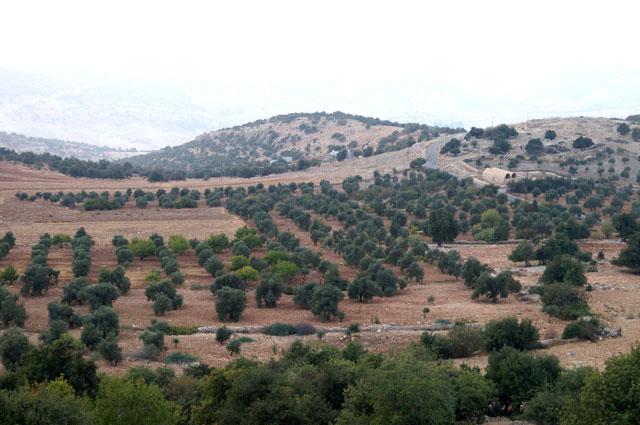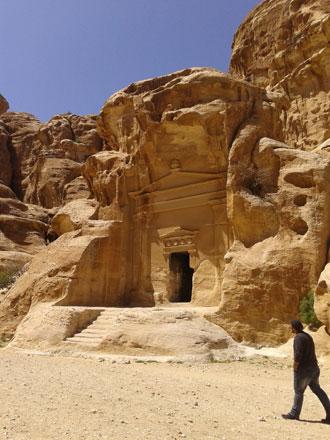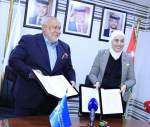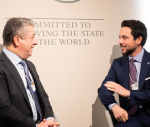You are here
UNDP, stakeholders discuss Sustainable Development Goals
By Ana V. Ibáñez Prieto - Oct 28,2017 - Last updated at Oct 28,2017
WADI MUSA — Representatives of the United Nations Development Programme (UNDP) in Jordan gathered on Thursday in Wadi Musa with members of the government, host communities and local media, in order to discuss the comprehensive work that is being implemented in the south of Jordan for the achievement of the Sustainable Development Goals (SDGs).
Mohammed Al Nawafla, president of the Petra Development and Tourism Programme (PDTRA), congratulated the UNDP on its achievements in the Kingdom, speaking on PDTRA’s joint programmes with the UN agency.
“UNDP has been a strong partner for us when it came to help the locals, they have collaborated with us extremely with many workshops, and we are thankful for their support on the signage of Petra and the surrounding areas,” said Al Nawafla.
UNDP’s Country Director Sara Ferrer stressed that the agency is “the main convener for sustainable human development and resilence within the UN family”, noting that the key points of the work of the UNDP in Jordan are “inclusive participation and social cohesion, resilent communities, livelihood and environment, and the enablement of an institutional framework for the realisation of the SDGs”.
Furthermore, Ferrer highlighted that UNDP’s role as a convener for development enables them to work at different levels to bring institutions, communities, private sector and academia together, stressing that the focus is on “ensuring national ownership and sustainability, investing in nurturing capacities, and strengthening institutions and community based organisations [CBOs]”.
Project managers of several initiatives were present at the meeting, briefing others on the objectives and results of each programme while discussing ideas for the future.
Nidal Oran, project director of the “Mainstreaming Biodiversity Conservation in Tourism Sector Development in Jordan” initiative, explained that the programme’s objective is to reduce the negative impact of tourism activities on Jordan’s biodiversity, stressing that “Petra is an important site both at local and international level and it must be sustained ensuring the preservation of cultural, archaeological and natural resources.”
BITS project represents the second intervention of the UNDP in PDTRA, with the first intervention being through the project “enhancing institutional capacities to reduce disaster risk and to integrate climate in the Hashemite Kingdom of Jordan”.
“The inclusion of Petra in the National Network of Natural Reserves list in Jordan is a key step in the preservation of the natural and archaeological heritage within the protected area,” said Oran, noting the importance of creating an eco-tourism programme and empowering the local community through employment.
Ghimar Deeb, project director of the Community Cohesion Grant Mechanism, was also present in the dialogue, briefing members on the project’s goal and outcomes.
“The Arab Spring and the Syrian crisis have resulted in a dismembering of the community’s cohesion and resilience, and the role of CBOs and no- governmental organisations is crucial on strengthening social cohesion,” said Deeb, explaining that the project’s goal is to support local institutions and governmental interference in providing basic services and maintaining social cohesion.
An example of this initiative is the “Green Schools” project led by Al Wadi Ladies for Social Development Association, which integrates students with special needs with other students with the aim of eliminating the idea of dissimilarity.
“Our purpose is to capacitate CBOs in tension areas at the community level and to train society leaders to be responsible and accountable on monitoring the impact of these partnerships grants,” explained Deeb.
Majed Hasanat, Project Director of the “Livelihood and employment” programme, spoke about the achievements since the establishment of the initiative.
“The project started out with the support of two women working from their homes in the production of simple textile products, but after receiving UNDP’s fund, the number of employees increased to eight, and they were able to take a soft and technical skills training to provide linens and other products requested by the local market,” said Hasanat.
“The main objective of this project was to develop the economical level of the targeted CBO and to increase the income of the women who work there, creating an investing opportunity and creating more jobs,” said Hasanat.
UNDP’s visit to Wadi Musa concluded with a field visit to several CBOs funded and supported by the UN agency, as well as the proposed protected area in Petra according to the BITS project.
Related Articles
AMMAN — Reflecting the spirit of inclusivity and collaboration of the Heart of Amman (HoA) Programme, the Greater Amman Municipality (GAM) i
AMMAN — Eight community-based organisations (CBOs) on Tuesday received grants worth $350,000 to implement pilot projects enhancing the role
PETRA — In 2008, local community members met to discuss a project aimed at protecting the natural heritage in Petra, which resulted in some
















